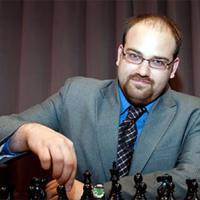
by Emily Sholtis & Matthew Pepper, Basis Policy Research
This blog is all about digging into the data. Whether you want to explore the impact of chess in schools or the distribution of Grandmasters across globe, the CCSCSL’s research blog has you covered! But chess isn’t just facts and figures. The game thrives thanks to the dedication and hard work of a massive network of players and professionals who have dedicated their lives to the game. To celebrate those literal and figurative champions of chess, we’ve invited former CCSCSL Grandmaster-in-Residence and 2013 U.S. Open Champion Josh Friedel (@joshfriedel) to share his story in our new series “Interview with a Grandmaster”.
Q1) At what point in your life did you choose to pursue chess full-time and what factors influenced your decision?
It was always what I wanted to do, but I'd say I made the firm decision about halfway through high school. While I had other interests besides chess, it was really the only thing I could imagine choosing as my career.
Q2) What does a typical week look like for you?
My ideal week has between 10-15 hours of teaching chess, 20-25 hours of study, and 3-6 hours of tennis or another form of exercise. I also regularly spend time cooking, reading, doing crosswords, and watching various TV shows/movies. Of course, many weeks are less than ideal, which tends to mean less energy for studying and more time spent watching shows.
Q3) What resources do Grandmasters typically use to get better at chess themselves?
I try to spend at least an hour a day doing difficult tactics and solving studies. My go-to sites for this are chesstempo, chess.com, chessity for studies, and this cool site which has only difficult mate in 3s. I also spent a lot of time on studying my games, working on my opening repertoire, and also checking out games in top level tournaments. Improving as a Grandmaster is very difficult, at least it is for me, but I've found this routine to be helpful if I keep up with it.
Q4) Please describe the uniqueness of the Saint Louis Chess Club and how it is viewed within the international chess community.
Almost everyone I know who has visited has been extremely impressed. Just the appearance is different from a normal chess club, as they have nice boards and sets, clocks provided, a full time staff, various lectures and tournaments throughout the week, etc. They also run elite events like the US Championship and Sinquefield Cup. While there are plenty of nice clubs out there, none of them have the resources that St. Louis does.
Q5) What advice would you have for younger players that aspire to become GMs?
The best advice I can give is to be stubborn. Everyone has a level where they get stuck, and I think a lot of people plateau because they get discouraged because they think the wall is harder to crack down than it actually is. I also think it is important to have curiosity. A lot of people work on openings and positions that they play and ignore ones which they don't see as often. To become a GM, you have to have a certain amount of universal knowledge, and the only way to develop this is to have an open mind and an explorer's mentality toward understanding chess.
Q6) What about being a Grandmaster would surprise a casual chess player?
A lot of GM play is based on timing. We don't just try to out calculate our opponents in every position or know all our openings until move 40. The key is about knowing when to calculate deeply, when to play based on understanding of the position, when it is best to carry out your plan or hinder your opponent's, when it is best to play move to move or long-term, etc. Practicing individual skills and areas of play is very important, but it is also crucial to know what the right moment is to use each of these tools.
Our thanks to Josh for his help with this blog post! You can follow him on Twitter at @joshfriedel or contact him for lessons/events at joshfriedel@hotmail.com.


